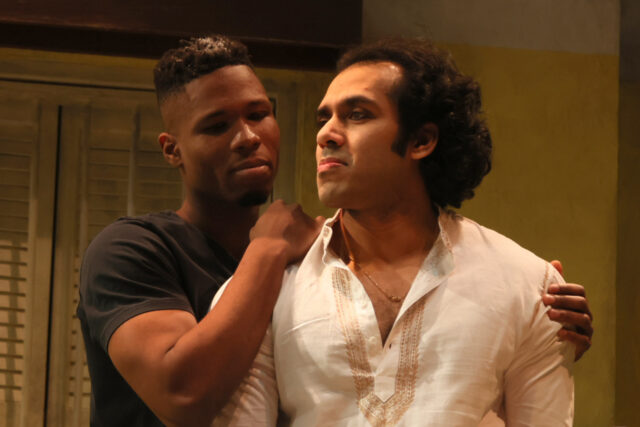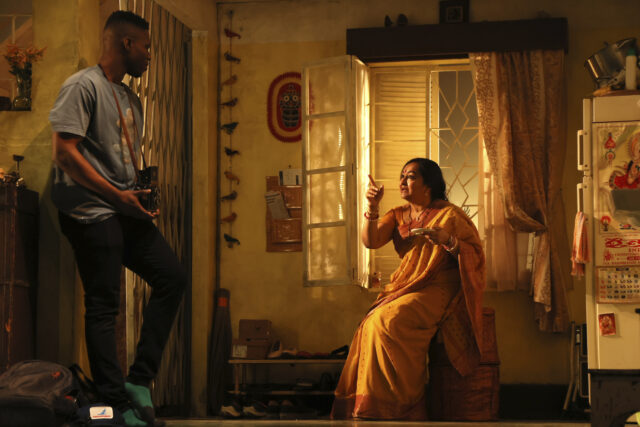
Jakeem Dante Powell (Raheem) and Abrar Haque (Choton) uncover a family secret in Shayok Misha Chowdhury’s Public Obscenities (photo by Hollis King)
PUBLIC OBSCENITIES
Theatre for a New Audience, Polonsky Shakespeare Center
262 Ashland Pl. between Lafayette Ave. & Fulton St.
Tuesday – Sunday through February 25, $97-$132
866-811-4111
www.tfana.org
Shayok Misha Chowdhury’s bilingual Public Obscenities is the surprise hit of the season. Following its sold-out run at Soho Rep, it moved to Theatre for a New Audience’s Polonsky Shakespeare Center, where it’s been extended through February 25.
Writer-director Chowdhury immerses the audience in Indian culture from the very beginning, as commercials for Indian products are projected onto a large screen like ads before a movie. Behind the screen is Peiyi Wong’s set, the interior of a house in South Kolkata with a mattress on the floor to the left, a refrigerator in the back, a table and chairs at the right, and a curtained-off kitchen (one character calls it “a mausoleum”); you can almost smell the Indian spices simmering throughout the family drama.
Choton (Abrar Haque), a Bengali American PhD student, has returned to South Kolkata with his boyfriend, Raheem (Jakeem Dante Powell), a Black cinematographer from America. They are staying with Choton’s aunt Pishimoni (Gargi Muhkerjee) and uncle Pishe (Debashis Roy Chowdhury), who are caring for Choton’s ailing, bedridden paternal grandmother, Thammi; Jitesh (Golam Sarwar Harun) runs the household and cares for Thammi. Looming over everything is a stern-looking portrait of Choton’s late grandfather, Dadu.
Choton is in Kolkata because he is applying for a dissertation fellowship at the University of Chicago. He’s working on a queer archiving project, planning to interview people he finds over Grindr, eventually meeting with Tashnuva Anan (Shou), who is kothi, and Sebanti (NaFis), who is hijra, two types of nonbinary and/or transgender identities in India. Meanwhile, Pishe is secretly chatting with a much younger single mother who lives in Minnesota.
Acknowledging Raheem’s interest in photography, Pishimoni asks Jitesh to show Raheem an old Rolleicord camera owned by Dadu. Raheem notices that there is still film in the camera, and when they examine it, they make a shocking discovery.

Pishimoni (Gargi Muhkerjee) makes a point to Raheem (Jakeem Dante Powell) in Public Obscenities (photo by Hollis King)
The Soho Rep and NAATCO National Partnership Project’s production of Public Obscenities, copresented by TFANA and Woolly Mammoth, might be three hours long (including intermission), but it flies by; Chowdhury makes the audience feel like it’s part of the family, even when the Hindi is not translated into English.
The intergenerational drama not only smartly explores gender identity and sexual orientation but uses technology to advance the plot and define the characters. Choton has trouble operating Raheem’s camera on his own. Raheem uses the sixty-year-old Rolleicord to show us Thammi, while we see Choton’s father only over FaceTime. Old printed-out photos reveal another side of Dadu. Meanwhile, Johnny Moreno’s cinematic projections move the action from the house to a riverbank, and one scene plays out as a prerecorded film.
The ensemble is terrific, led by Haque in his impressive New York City debut, Muhkerjee (Women on Fire: Stories from the Frontlines, The Namesake) as the inquisitive Pishimoni, Harun (Marat-Sade, Mrichchakatikam) providing occasional comedy as Jitesh, and Anan, who is a revelation as Shou. Enver Chakartash’s costumes, Barbara Samuels’s lighting, and Tei Blow’s sound, which includes outdoor nature tones echoing through the theater, further immerses the audience into Indian culture.
Public Obscenities moved from Soho Rep to TFANA as part of the Under the Radar festival, but the secret is out; the show is no longer flying under the radar.
[Mark Rifkin is a Brooklyn-born, Manhattan-based writer and editor; you can follow him on Substack here.]